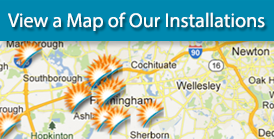Solar for Your Home
Rebates and Incentives
Solar Power is more affordable than ever for Massachusetts homeowners.
With the variety of financial options and incentives available, SolarFlair understands that going solar can be confusing for homeowners which is why we will take the time to explain ALL of the options. At SolarFlair, we take an advisory approach to helping customers understand the solar opportunity and we will take the time to thoroughly explain everything. We take the guesswork out of residential solar power.
Here is a list of available incentives with links to the most up-to-date information regarding state and federal grants, incentives and rebates:
Solar Massachusetts Renewable Target (SMART) Program:
The SMART Program is a monthly financial incentive program for individuals who purchase and install solar for their homes and businesses.
- The SMART program requires the three main Electric Distribution Companies (EDC’s) – Eversource, National Grid, and Unitil – to make incentive payments directly to homeowners who install systems within their territory.
- The incentive is calculated based on a “block” system, where each block represents 200 MW of solar energy generation capacity. Each time a block is filled (i.e. 200 MW of solar are installed, the incentive amount decreases slightly. It is unknown how long it will take for each block to reach capacity so it is in your best interest to act quickly if you are serious about going solar.
- The SMART Program begins on November 26, 2018 and replaces the current solar incentive program in Massachusetts, Solar Renewable Energy Credits (SRECs).
For more information on SMART and other incentives please give us a call!
Net Metering
As of December 2009, all photovoltaic system owners served by the major utilities receive full retail value when they generate more power than they need.
Under the Green Communities Act, utility companies must now compensate customers for excess electricity at the retail rate rather than the lower wholesale rate. Additionally, customers may allocate their credits to other customers, allowing those without facilities to take advantage of net metering benefits as well. With this provision in place, Massachusetts now has one of the strongest "net metering" laws in the country.
Net Metering Made Simple:
1) Your solar system WILL be connected to the electric utility grid.
2) When your solar system produces more electricity than you use, your electric meter will spin backwards. When you are using more electricity than your solar system is producing (e.g. at night) your meter will spin forwards.
3) You will still receive an electric bill from your utility provider each month. For months in which you produce energy in excess of what you use, your bill will show a negative figure under the “Total Usage” header.
Database of State Incentives for Renewables and Efficiency (DSIRE):
The U.S. Department of Energy maintains a comprehensive resource for State and Federal rebates and incentives for renewable energy. This is a good place to find more detail on the available incentives.
RECENT NEWS
Contact us for a SITE ASSESSMENT.
SolarFlair’s sales associates will work with you to design the most efficient, aesthetically pleasing system possible for your home.

 Call us! MA
Call us! MA 